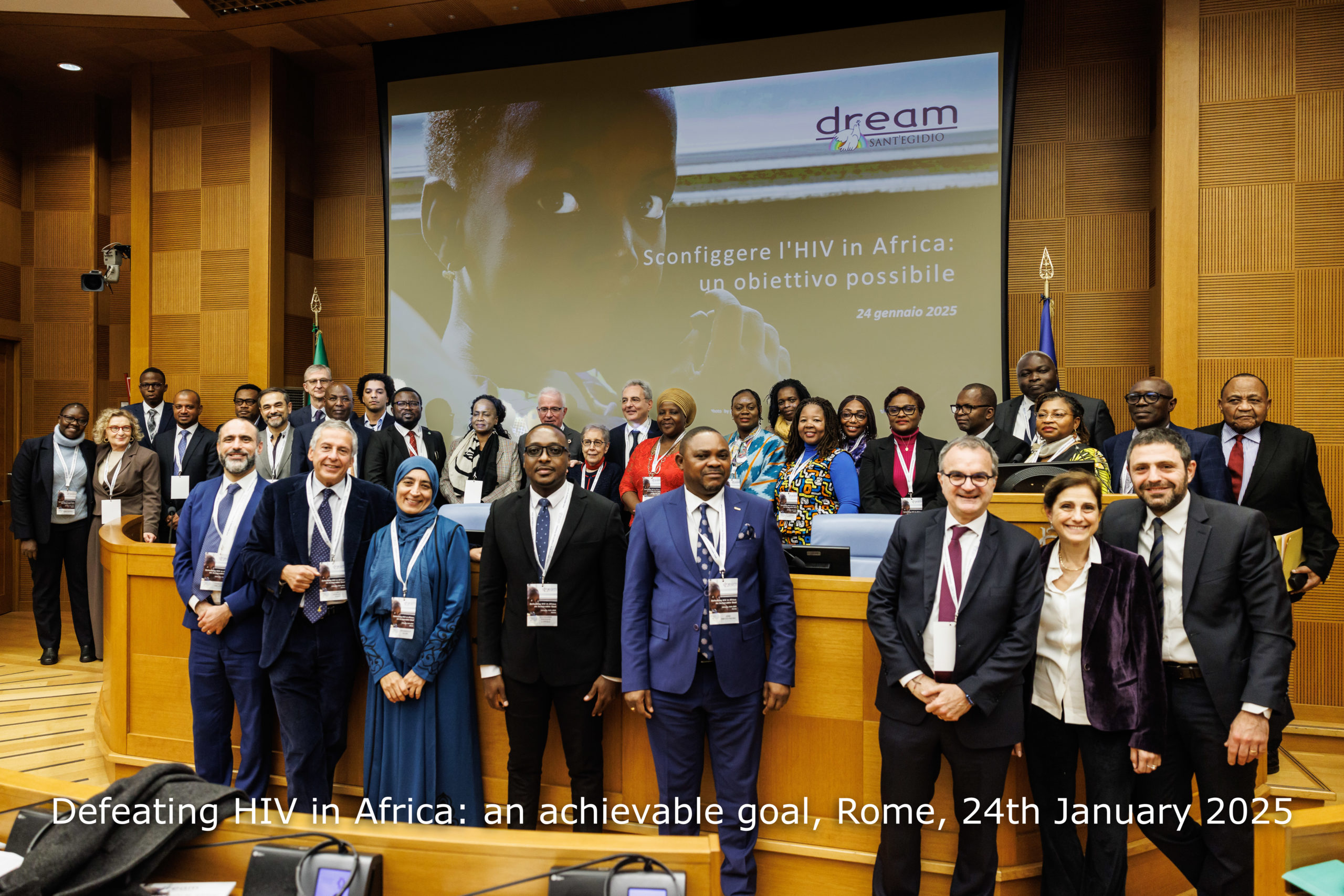Refocusing the fight against AIDS in Africa on the international agenda: the goal of the conference ‘Defeating HIV in Africa: a possible commitment’
On January 24th, in the Hall of Parliamentary Groups in Rome, a conference revisited the major successes of the DREAM program and outlined the challenges ahead.
Bringing the fight against AIDS in Africa back to the forefront of international attention, with the aim of achieving accessible treatment, was the goal of this conference, organized by the DREAM program of the Community of Sant’Egidio in collaboration with the Italian Ministry of Foreign Affairs. The event emphasized that defeating HIV in Africa is possible, but only if we remain vigilant. This message was underscored through speeches and discussions among DREAM program operators, health ministers from African countries where the project operates, and representatives of national and international institutions.
The conference opened with welcoming remarks by Monsignor Vincenzo Paglia, President of the Pontifical Academy for Life, who praised the DREAM program as an exemplary initiative in healthcare and noted how DREAM is “a unifying dream that shows we can only save lives together.”
“There have been stories of success in recent years in fighting HIV, but this must not make us forget that the virus is still circulating and claiming many lives. There are nearly 40 million people living with HIV/AIDS worldwide, and its spread is increasing not only in Africa but also outside it,” said Marco Impagliazzo, President of the Community of Sant’Egidio. “DREAM has overcome the infamous double standard. When we started in Mozambique in 2002, it seemed impossible to bring the same treatments available in the West to Africa,” he added, recalling the significant prejudice against Africans. “However, DREAM has shown that it is possible to win this battle by engaging people, training many socio-health operators in Africa, and involving women living with the disease, who have committed to helping others. Today, thousands of babies are born healthy to HIV-positive mothers, and these mothers continue to live: this is our greatest success.”
Italian Minister of Foreign Affairs, Antonio Tajani, also highlighted the program as a model of positive cooperation, emphasizing the need to “view Africa not through European lenses but African ones” and to address Africa’s health challenges with “a commitment from everyone.”
The Minister of Health of Malawi, Khumbize Kandodo Chiponda, and the Deputy Minister of Health of Kenya, Harry Kimtai Kachuwai, stressed how the DREAM program has become an integral part of their countries’ healthcare systems in the fight against HIV.
Milestones, Challenges, and New Frontiers
Speakers from the DREAM project reflected on its history, past achievements, and future challenges, many of which hinge on the need for new investments. Prof. Stefano Orlando pointed out that, despite significant successes, disparities persist between and within countries, particularly between urban and rural populations. Dr. Annamaria Doro stressed the importance of reinforcing psychological support for those who face the stigma of the disease and of personalizing care as much as possible, noting that the real protagonists in the fight against HIV are the people themselves. Prof. Carlo Federico Perno highlighted the need to invest in new drugs and therapies, given that the virus is becoming more resistant to existing treatments, and that new diseases, beyond AIDS, are beginning to emerge.
Dr. Abdul Majid Noorjehan, head of the DREAM Center in Zimpeto, Mozambique, underscored the need for new models to tackle future health challenges, which are not limited to Africa but affect the entire world: “Global health challenges demand a collective and united response. Ignoring the problem today means paying the price tomorrow.”
Peter Sands, Executive Director of the Global Fund to Fight HIV, TB, and Malaria, emphasized that progress in the fight against HIV has been achieved through global collaboration and that such efforts are crucial to maintain and build upon these achievements. Dr. Marco Vitoria from the WHO highlighted that community involvement has been a cornerstone of DREAM’s success, stressing the importance of amplifying the voices of those most affected and relying on their efforts in combating the disease.
A Call for Continued Vigilance
Cacilda Isabel Massango, an activist and member of the HIV Patients Association of Mozambique, delivered a powerful testimony, reminding attendees of the constant risk of regression in the fight against HIV. “We must not let the progress we’ve made go to waste. This conference fosters a dialogue among Africans, Europeans, and international organizations to find shared solutions so that our achievements in securing the right to treatment are not in vain and that there remains a future for me and for millions of Africans.”
In his closing remarks, the President of the Community of Sant’Egidio expressed gratitude to all who have supported the DREAM program, reaffirming that “healing is possible, recovery is possible, and long life is possible.”
The conference reinforced the idea that the fight against HIV in Africa is not just an African issue but a global challenge that requires solidarity and determination from the entire international community.
